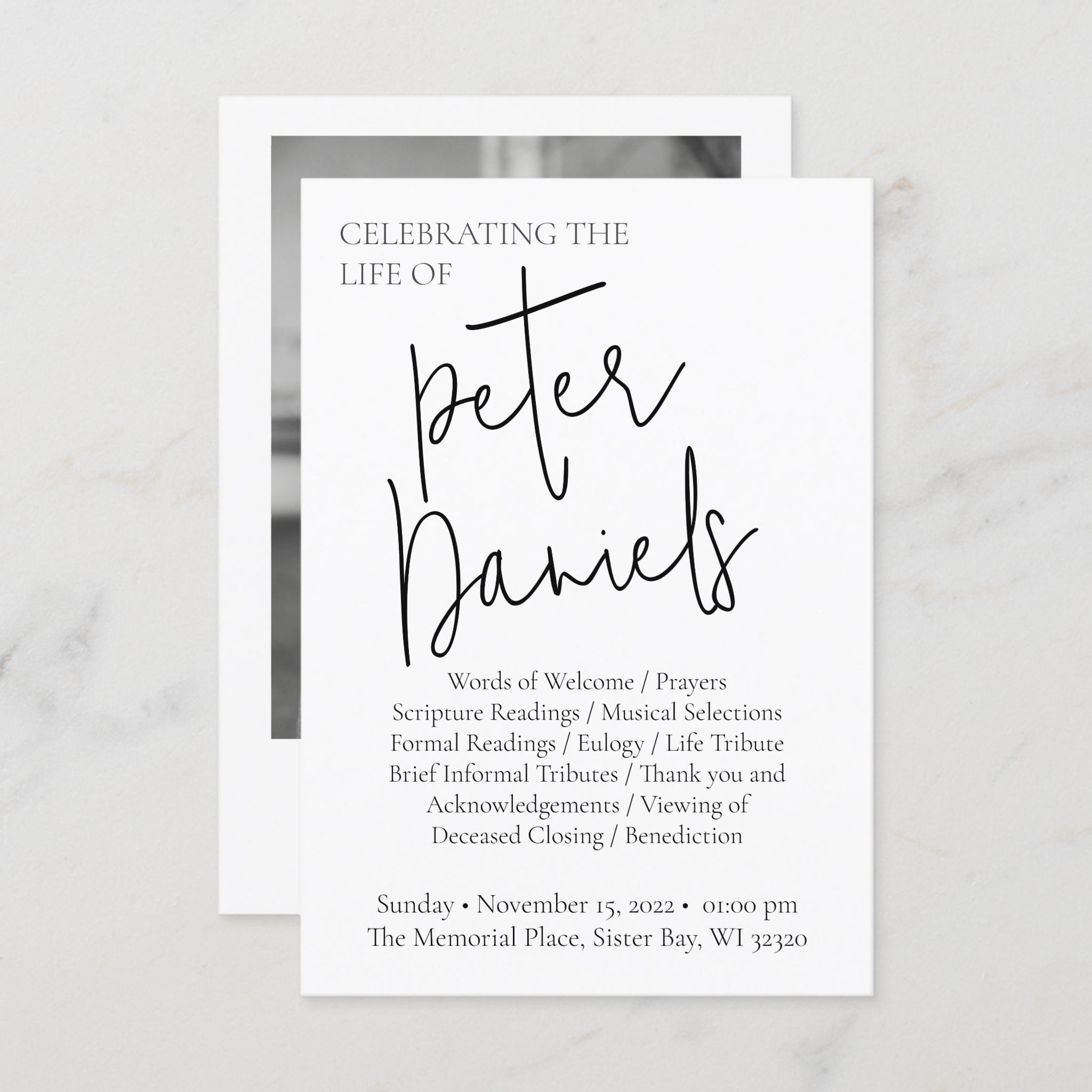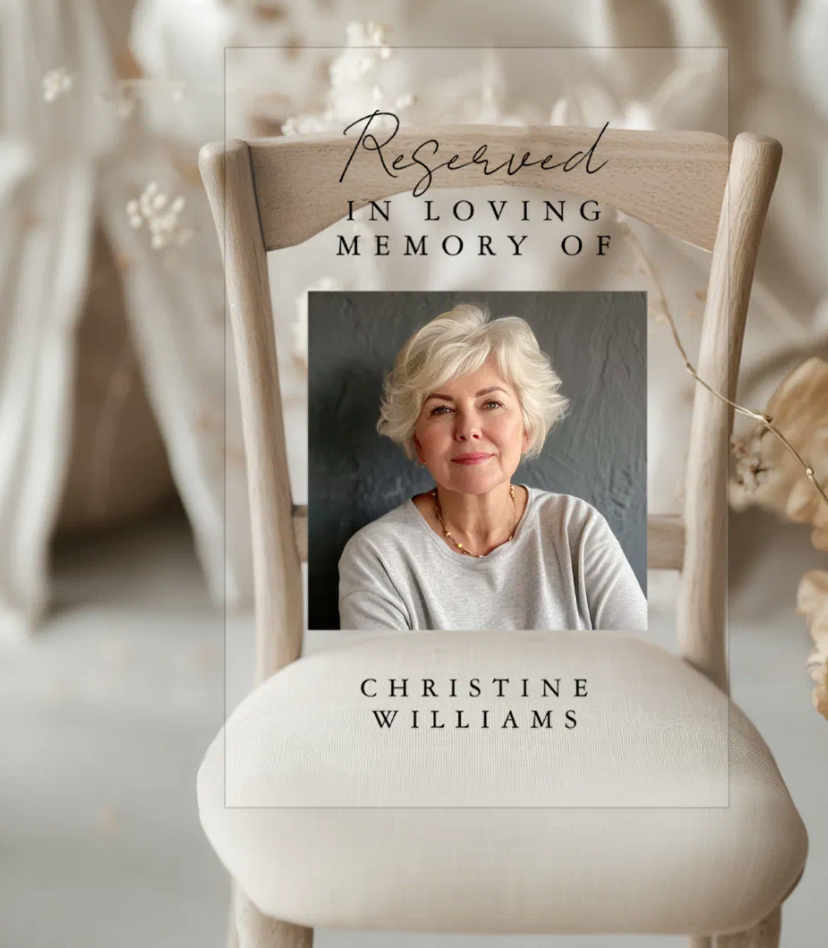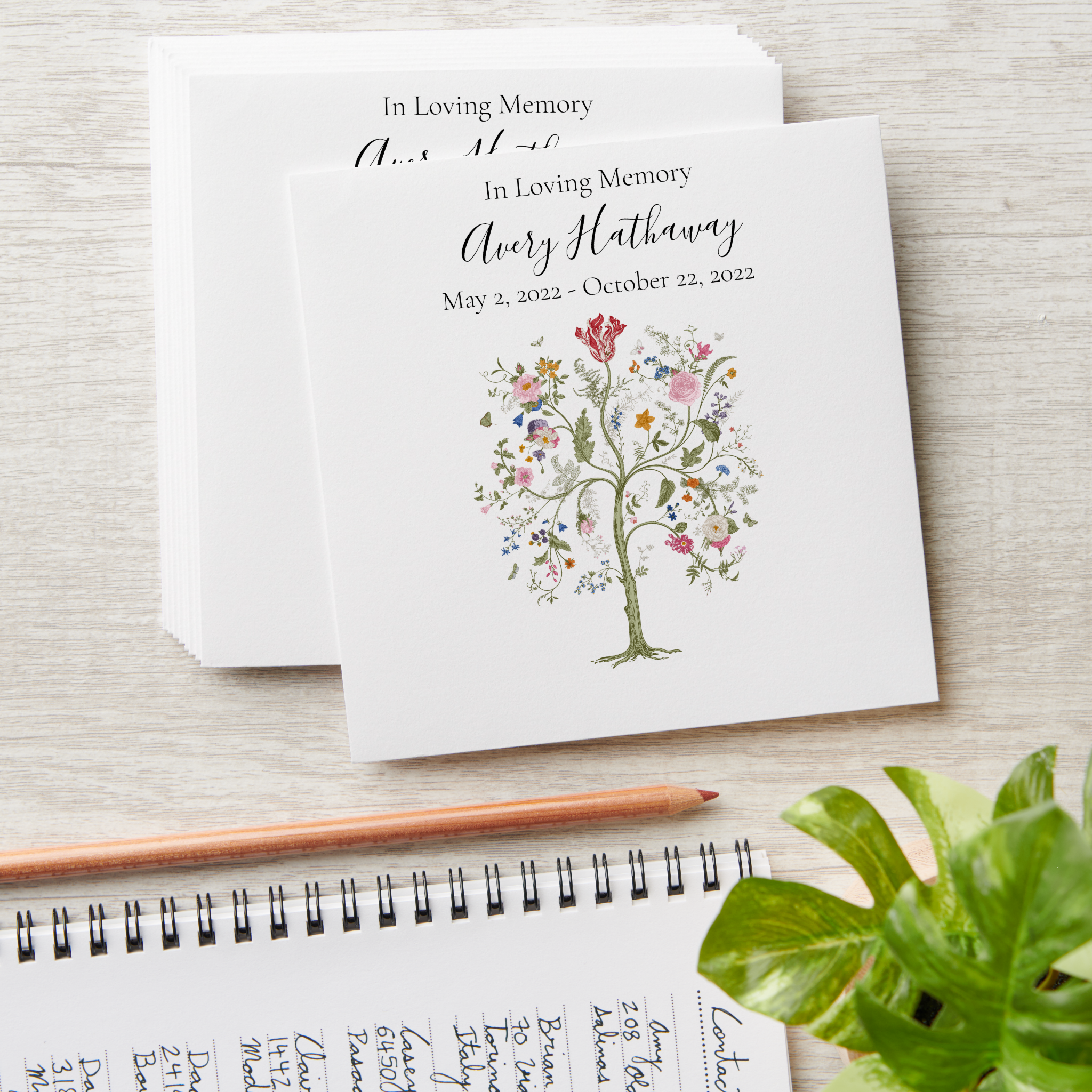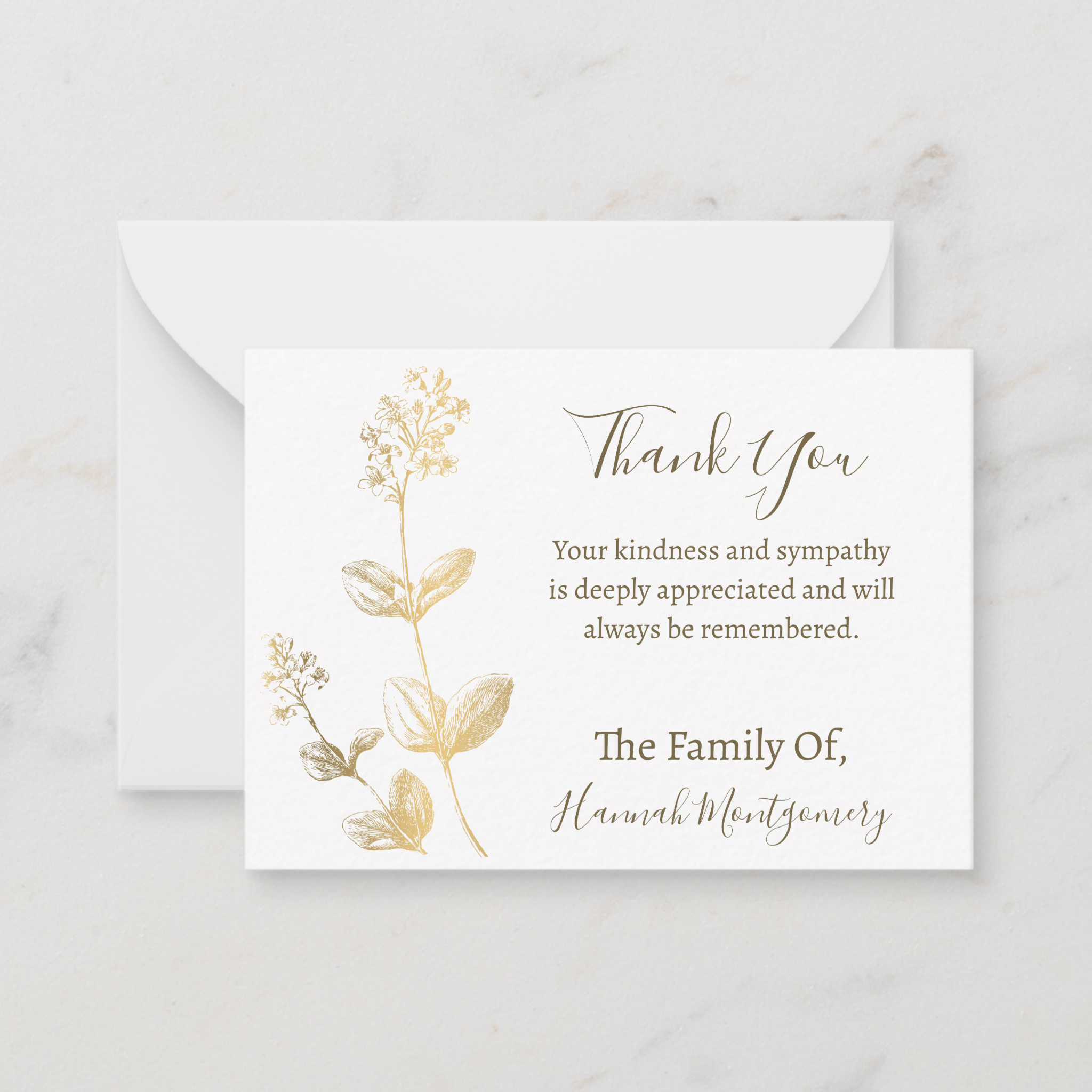We may earn money or products from the companies mentioned in this post. As an Amazon Associate I earn from qualifying purchases. Disclosure of Material Connection: Some of the links in this post may be "affiliate links." This means if you click on the link and purchase an item, I will receive an affiliate commission.
When we lose someone we love, the funeral service provides a formal opportunity to honor their life and say goodbye. But what happens after the formal service concludes? For many families, funeral receptions become an equally important part of the memorial process—a time when the structured ceremony gives way to something more personal and intimate.
The Complete Guide to Funeral Receptions: Creating Meaningful Gatherings After the Service
A thoughtfully planned reception creates space for what many grieving people desperately need: community, connection, and the comfort of shared memories. Unlike the ceremony itself, which often follows traditional protocols, the reception allows for personalization and a more relaxed atmosphere where stories can be shared, tears can flow freely, and even laughter can emerge amid grief.
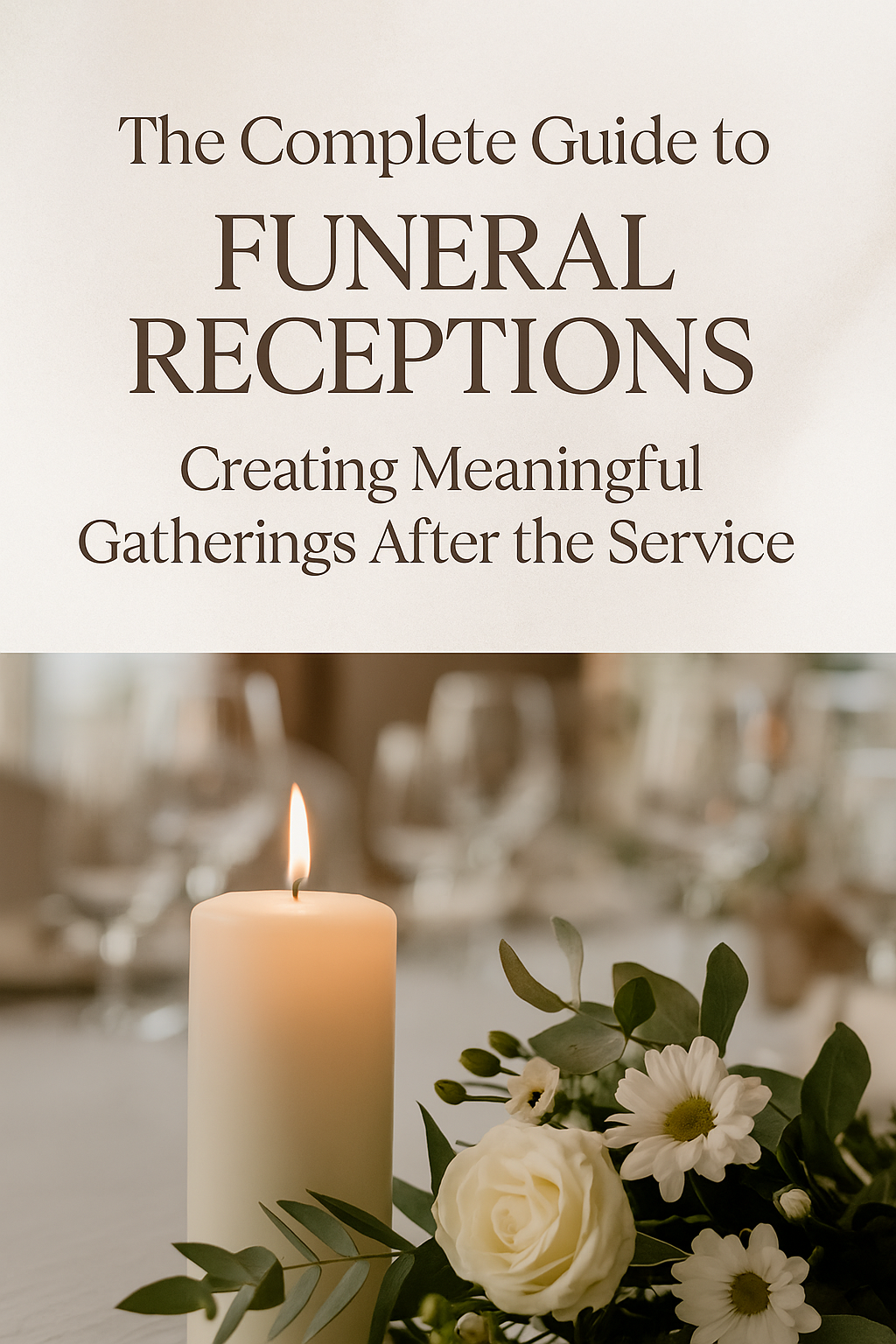
Why Funeral Receptions Matter
As someone who has navigated the fog of loss and planned my father’s funeral arrangements while exhausted from grief, I understand that thinking about reception details might feel overwhelming. That’s precisely why I created this comprehensive guide—to help you create a meaningful gathering without adding to your burden during an already difficult time.
What Is a Funeral Reception?
A funeral reception (sometimes called a repast, post-funeral gathering, or wake) is a social gathering held after the formal funeral service and burial or cremation. This gathering provides an opportunity for friends and family to connect, share memories, and support one another in a less formal setting than the funeral service itself.
Traditionally, these gatherings include refreshments or a meal and take place immediately following the funeral service. However, like many aspects of modern funerals, receptions have evolved to reflect personal preferences rather than rigid traditions.
Historical Context of Funeral Receptions
Funeral receptions have existed across cultures for centuries, though they take different forms:
- The Irish wake tradition involves gathering to keep watch over the deceased before burial, often including food, drink, and storytelling
- Jewish shiva involves a seven-day period where mourners receive visitors at home, with community members providing meals
- In many Southern U.S. traditions, church communities organize meals for the family following services
- Some cultures celebrate with elaborate feasts that honor the deceased’s life rather than focusing solely on mourning
Today’s funeral receptions often blend these traditional elements with personalized touches that reflect the unique life being honored.
Planning a Funeral Reception While Grieving
When you’re navigating grief, even simple decisions can feel overwhelming. The weight of planning a reception might seem impossible when you’re already emotionally depleted. Here’s how to approach planning with self-compassion:
When to Hold the Reception
Most commonly, receptions are held immediately following the funeral service and burial or cremation. This timing is practical for out-of-town guests who can attend both events during their visit. However, you have several options to consider:
- Immediately after the service: The traditional approach, allowing all funeral attendees to transition directly to the reception
- Later the same day: Providing a brief break between events for family to have private time at the gravesite
- The following day: Allowing more rest for the immediate family, though potentially difficult for traveling guests
- Several weeks later: Some families choose to hold a “celebration of life” reception after some time has passed, when they feel more emotionally prepared
There is no right or wrong answer—only what works for your unique situation and energy levels.
Who Should Be Invited
Consider these questions when deciding on the guest list:
- Do you want to include everyone who attended the funeral, or make it a smaller gathering?
- Are there people who couldn’t attend the service who might come to the reception?
- Do you want to include colleagues, community members, or distant connections?
- Would the person who passed want an inclusive gathering or a more intimate one?
Many families include a note in the funeral program or have the officiant announce reception details at the end of the service. For smaller gatherings, personal invitations can be extended through family members or the funeral director.
Choosing the Perfect Location
The reception venue sets the tone for the gathering. Your choice should balance practicality with meaning and consider your energy limitations while grieving. Common locations include:
1. Religious Facility Halls
Many churches, synagogues, mosques, and other religious facilities have community spaces available for funeral receptions, often at minimal or no cost for members. Benefits include:
- Familiar and comfortable setting for those who just attended the service
- Often have volunteer help available
- Usually have necessary kitchen facilities
- Minimal transportation logistics if held in the same location as the service
2. Family Home
Hosting at the home of the deceased or a family member creates an intimate atmosphere and was traditionally the most common setting for post-funeral gatherings. Consider:
- Creates a personal, comfortable environment
- Allows the family more control over timing and flow
- No rental costs involved
- May feel overwhelming to prepare and clean the space while grieving
- Could feel crowded if space is limited
3. Restaurants or Catering Halls
For a funeral reception with minimal planning responsibility for the family, restaurants offer convenience:
- Professional staff handles all food and service details
- No cleanup required
- Various price points available
- Private rooms can often be arranged
- May require reservations well in advance
- Could be more costly than other options
4. Community Centers or Clubhouses
Community spaces often provide affordable options with ample room:
- Generally less expensive than commercial venues
- Typically offer flexible setup options
- May have kitchen facilities available
- Often require bringing in your own food and supplies
- May need volunteers to help with setup and cleanup
5. Outdoor Venues
For someone who loved nature, consider parks, gardens, or backyard gatherings:
- Can create a uplifting atmosphere in beautiful surroundings
- Often more spacious than indoor venues
- May hold special significance if it was a favorite place of the deceased
- Weather considerations make planning more complicated (see these stunning custom seed packets)
- May require permits or rentals (tables, chairs, tents)
When selecting a venue, prioritize locations that minimize complexity and additional stress. Sometimes the simplest option is the kindest choice for yourself during grief.
Food and Refreshments: Nourishing During Grief
Food has long been associated with comfort during times of loss. The act of breaking bread together creates community and offers practical support for those who may be too exhausted by grief to prepare meals for themselves.
Catering Options
Consider these approaches to providing food at the reception:
1. Professional Catering
- Full-service catering handles everything from delivery to setup and cleanup
- Buffet catering provides food only, typically with setup
- Drop-off catering simply delivers prepared food
- Consider funeral home recommendations for caterers experienced with these events
2. Restaurant Arrangements
- Many restaurants offer special menus for funeral receptions
- Some provide private or semi-private spaces
- Options range from simple coffee and desserts to full meals
3. Community-Provided Meals
- Religious communities often have traditions of providing funeral meals
- Friend coordinators can organize potluck contributions
- Meal train organizers might arrange for food delivery
4. Family-Prepared Options
- Can be meaningful but potentially overwhelming
- Consider asking specific family members known for signature dishes
- Simple, make-ahead options work best
Menu Considerations
When planning the menu, keep these factors in mind:
- Simplicity: Easy-to-eat foods that don’t require complicated utensils
- Variety: Options for different dietary needs and preferences
- Meaning: Perhaps including favorite foods of the person being honored
- Practicality: Foods that can be prepared ahead and served at room temperature
- Comfort: Familiar, soothing foods that provide emotional as well as physical nourishment
Sample Menu Ideas
Light Refreshments:
- Assorted finger sandwiches
- Vegetable and fruit platters
- Cheese and cracker arrangements
- Coffee, tea, water, and soft drinks
Buffet Meal:
- Salad options (green salad, pasta salad)
- Two main dish options (one vegetarian)
- Two side dishes
- Bread or rolls
- Dessert assortment
- Beverages
Themed Menu: Consider serving the favorite foods of your loved one or dishes from their cultural background as a way to honor their memory and spark conversation about their life.
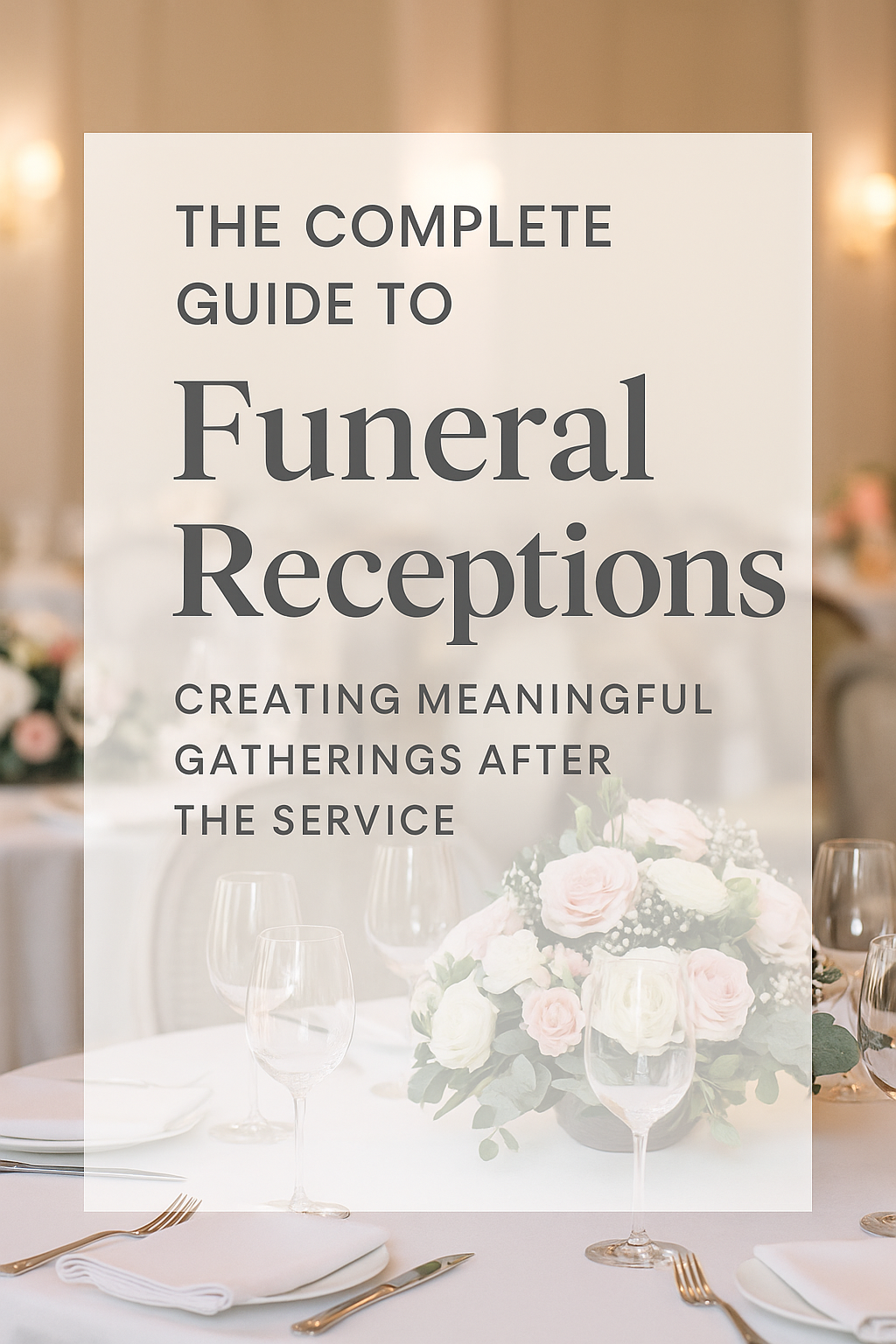
Creating a Meaningful Atmosphere
The atmosphere of the funeral reception sets the tone for how people will interact and remember the gathering. Consider these elements when planning:
Personalized Touches
Small details can transform a standard reception into a personalized tribute:
- Memory tables displaying photographs, achievements, or hobbies
- Playlist of favorite songs or meaningful music
- Slideshow of photographs from throughout their life
- Guest book where attendees can share memories and messages
- Memorial items such as customized bookmarks, seed packets, or photo cards
- Meaningful decorations reflecting the deceased’s interests or passions
Interactive Memory Sharing
Consider creating opportunities for guests to actively participate:
- Memory cards where guests write favorite memories to be collected for the family
- Story corner with a comfortable seating area where people can share remembrances
- Audio or video recording station to capture stories and memories
- Memory jar where written memories are collected to be read later when the family has more emotional capacity
Finding Balance in the Atmosphere
Funeral receptions often navigate the delicate balance between honoring grief and celebrating life. Some considerations:
- Is your cultural or religious tradition more focused on solemn remembrance or celebration?
- What would the person who passed have wanted for this gathering?
- How can you create space for both tears and laughter?
- How can the environment support those who are struggling emotionally?
Remember that meaningful gatherings often make space for the full spectrum of emotions that accompany loss.
Practical Logistics While Grieving
When grief fog makes even simple tasks challenging, having a clear checklist for reception logistics can be invaluable:
Timeline Planning
Create a simple timeline to ensure the reception flows smoothly:
- Setup time: Allow sufficient time before guests arrive
- Receiving guests: Consider whether you want a formal receiving line or informal greeting
- Food service: Determine when refreshments will be available
- Program elements: Schedule any planned activities (prayers, toasts, open sharing)
- Conclusion: Decide if the reception will have a formal end or natural dispersal
Support Team Assembly
No one should navigate funeral planning alone. Consider asking for specific help with:
- Venue coordination: Someone to handle logistics with the location
- Food organization: A point person for caterers or potluck coordination
- Greeting assistance: Friends who can welcome guests and provide direction
- Setup/cleanup crew: People specifically assigned to handle physical arrangements
- Memory collection: Someone to manage guest books, cards, or memory stations
- Child supervision: Activities or supervision for young children attending
Communication Methods
Clear communication helps prevent additional stress:
- Service programs: Include reception details in the funeral program
- Verbal announcements: Ask the officiant to share information at the service conclusion
- Online updates: Use memorial websites or social media for sharing details
- Family spokesperson: Designate someone to answer questions and provide information
Financial Considerations and Options
Funeral expenses can be significant, and receptions add additional costs. Here are approaches to manage financial aspects with sensitivity:
Budget-Friendly Options
- Holding the reception at a family home, religious facility, or community center instead of a commercial venue
- Organizing a potluck rather than full catering
- Focusing on light refreshments rather than a full meal
- Using digital photographs rather than printed displays
- Accepting offers from friends and community members to contribute
Cost Breakdown Expectations
While costs vary significantly by location and scale, these ranges provide general guidelines:
- Venue rental: $0 (home/religious facility) to $500+ (event space)
- Food and beverage: $5-25 per person depending on menu complexity
- Decorations/memorial items: $50-300 depending on elaborateness
- Service items (plates, napkins, etc.): $1-3 per person
- Additional services: Variable costs for items like photography, music, etc.
When Financial Constraints Are Significant
- Focus on meaning rather than scale—small gatherings can be deeply significant
- Consider a delayed reception when resources might be more available
- Look into memorial society memberships that may include reception facilities
- Ask the funeral director about payment plans or options
Special Considerations for Different Situations
Every family’s needs and circumstances are unique. Here are considerations for specific situations:
Children at Receptions
- Consider having a designated area with appropriate activities for children
- Prepare simple, child-friendly food options
- Assign someone specifically to oversee children’s needs
- Create age-appropriate ways for children to participate in memory sharing
Virtual Participation Options
For those unable to attend in person:
- Set up a video call station where remote family can join
- Create a memorial website where people can leave messages
- Consider a hybrid event with both in-person and online elements
- Designate someone to manage the technical aspects of virtual participation
Cultural and Religious Specifics
Different traditions have specific reception customs that may need accommodation:
- Jewish shiva traditions include specific foods and practices
- Many Catholic traditions include prayer elements during the meal
- Some cultures have specific foods associated with funeral gatherings
- Certain religions have dietary restrictions to consider
When Circumstances Are Complicated
In situations where family dynamics are strained or circumstances difficult:
- Consider having separate gatherings if conflicts are significant
- Assign peacekeeping relatives to help manage challenging relationships
- Create structure that minimizes potential tension points
- Focus on honoring the deceased rather than navigating old conflicts
After the Reception: Self-Care and Next Steps
The period following the funeral and reception often brings a new wave of grief as the activity subsides and reality sets in:
Immediate Self-Care
- Allow yourself to rest completely after the events conclude
- Accept help with cleanup and final arrangements
- Acknowledge the emotional toll of the day and give yourself permission to process
- Consider having a close friend or family member stay with you
Preserving Memorial Elements
- Collect and store guest book entries, memory cards, and other tributes
- Save digital copies of photos or slideshows
- Document gift senders and support received for acknowledgment
- Consider creating a memory book incorporating elements from the reception
Acknowledgments and Thank-You Notes
- Simple, heartfelt notes are appropriate
- Focus on expressing gratitude rather than perfection
- Consider using a basic template if writing multiple notes feels overwhelming
- Acknowledge specific contributions that were particularly meaningful
Frequently Asked Questions About Funeral Receptions
Based on my experience helping grieving families, these are the questions that often arise:
How long should funeral receptions last?
Most receptions last between 1-3 hours, though there’s no strict requirement. Consider your energy levels and venue limitations when deciding timing. It’s perfectly acceptable to have a defined end time included in the announcement.
Is alcohol appropriate at a funeral reception?
This depends entirely on cultural traditions, personal preferences, and venue restrictions. Many receptions include a toast or limited beverages, while others focus exclusively on non-alcoholic options. Consider what would best honor the person who passed.
Who typically pays for the funeral reception?
Traditionally, the same person or people who pay for the funeral also cover reception costs. However, it’s increasingly common for family members to share expenses or for friends to contribute through organized meal preparations.
Is it necessary to have a reception after every funeral?
No, receptions are optional and should reflect the wishes of the deceased and the needs of the grieving family. Some families choose very small gatherings or no reception at all, particularly if travel constraints, financial considerations, or emotional capacity make it difficult.
How can I honor someone who didn’t want a funeral service?
A reception-only gathering can be a perfect solution when someone specified “no funeral.” This allows for remembrance and community support without the formal ceremony they wished to avoid.
Conclusion: Creating Space for Both Grief and Connection
Funeral receptions holds a unique place in the grieving process—it stands at the intersection of formal ceremony and the return to everyday life. When thoughtfully arranged, it provides essential community support during a vulnerable transition.
Remember that there is no single “right way” to hold a reception. The most meaningful gatherings reflect both the person being honored and the needs of those grieving. Whatever form your reception takes—elaborate or simple, large or intimate—its value lies in creating space for shared remembrance and mutual support.
As you navigate planning during grief, be gentle with yourself. Focus on the elements that matter most to you, and allow others to help with the rest. The perfect reception isn’t about flawless execution but about authentic connection during one of life’s most challenging transitions.
If you found this guide helpful, please consider sharing it with others who might benefit. For additional resources on navigating grief and funeral planning, explore the other articles in our Funeral Reception Planning series or download our free funeral planning checklist.
[About the Author: Becca Niederkrom founded Farewell Files after experiencing firsthand the overwhelming nature of funeral planning while grieving. Through practical resources and compassionate guidance, she helps others navigate end-of-life planning with greater ease and intention.]
you might also like to read:
How to Choose the Perfect Funeral Reception Venue: Options Beyond Funeral Homes
Funeral Reception Etiquette: Navigating Difficult Conversations While Honoring Your Loved One
10 Compassionate Funeral Reception Food Ideas When You’re Too Exhausted to Plan


